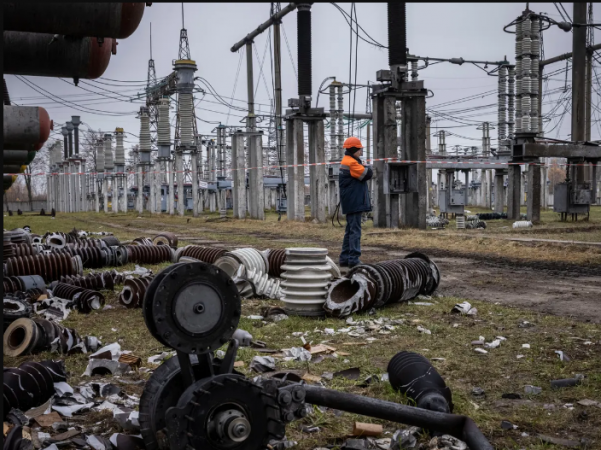
Kyiv: The power plant workers have constructed protective shields using enormous concrete blocks around some of their valuable transformers, the ones that are still in operation and buzzing with electricity, in order to better withstand the upcoming Russian missile attack.
The power plant's control room's blown-out windows are patched with chipboard and stacked sandbags so that the operators who staff the desks around-the-clock and keep an eye on gauges, screens, lights, and knobs are less likely to be killed or hurt by lethal shrapnel.
The director of the plant, to which a group of Associated Press journalists had unusual access, declared, "As long as there is equipment that can be repaired, we will work."
Also Read: Earthquake hits Indonesia, know its intensity
Because Ukrainian officials claimed that providing such information could aid Russian military planners, neither the name of the plant nor its location are provided by the AP. Both the plant's manager and his staff declined to give their full names for the same reason.
The operators have prepared armoured vests and helmets to wear during the deadly missile hail so they can remain at their posts and not join less important workers in the bomb shelter because the plant cannot function without them.
With each Russian airstrike, more damage is done, more craters and blast holes are left in the walls that have already been scarred by explosions, and more doubts are raised about how long Ukraine's energy workers will be able to keep homes heated, powered, and lit during the bitterly cold winter.
Nevertheless, they maintain power despite the odds and occasionally at the expense of their lives. They are securing battered plants with courage, devotion, inventiveness, and diminishing supplies of spare parts. By squeezing every extra watt of electricity they can into the grid, they are resisting Russian President Vladimir Putin's nearly 11-month invasion and his military's attempts to weaponize winter by trapping Ukrainians in the chilly night.
In Ukraine, power is essentially hope, and the workers at the plant won't let hope die.
Also Read: Floods wreaking havoc in California, lives of millions affected
The plant, in their eyes, is more than just a facility for producing electricity. After decades of tending to its whirling turbines, thick cables, and humming pipes, it has developed into something they have grown to love and are fervently trying to preserve. They find it painful to witness it being slowly but steadily wounded by repeated Russian attacks.
"The station is like a living thing; each organ serves a purpose. But far too many organs have already suffered harm, Oleh said. He has spent 23 years working at the plant.
"Watching this all hurts so much. This stress is unbearable. Like small children, we carried this station in our arms, he continued.
The government of Ukraine claims that since September, waves of Russian missile and drone explosion attacks have destroyed and damaged about half of the country's energy infrastructure. Millions of people now survive on sporadic power, sometimes for only a few hours per day, as rolling power cuts have become the norm across the nation. Additionally, the bombardments have made Ukraine stop exporting electricity to its neighbours Moldova, Slovakia, Romania, Hungary, and Poland.
According to Russia, the strikes are intended to make Ukraine less able to defend itself. According to Western officials, it is a war crime to cause civilians the suffering that blackouts do.
The plant that the AP team visited has sustained severe damage as a result of repeated strikes. Thousands of homes and businesses are still powered by it, but according to its employees, production levels are significantly lower than they were before the invasion.
The entire building has scars. There are scattered missile fragments because workers were too busy to clean up after the missiles landed. Workers claim that their families wish them God's protection as they leave for their shifts.
Mykola made it through one of the attacks. When Ukraine was still a part of the Soviet Union, he began working at the plant 36 years ago.
He remembered, "The windows flew out instantly, and dust started to pour from the ceiling." He put on his armoured vest and helmet and ventured outside instead of taking cover in the bomb shelter so he could immediately assess the damage.
Mykola declared, "We are not afraid. "We're more concerned with the machinery required to produce light and heat."
According to Oleh, Russian missile targeters appear to be adapting their strategies as they go along in order to do more harm. Previously, missiles would explode at ground level, creating craters, but now they detonate in the air, wreaking havoc over larger areas.
Also Read: Daesh claims responsibility for the Kabul attack that killed five people
The repair teams at the plant scramble as soon as it's safe, beginning a depressing cycle of death and rebirth.
"The Russians bomb and we rebuild, and they bomb again and we rebuild. We really need assistance. Oleh said, "We can't manage this place by ourselves. As long as we have the necessary tools, we will repair it.